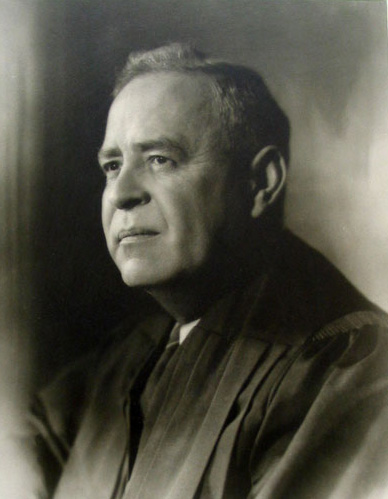- Wiley Blount Rutledge
Infobox Judge
name = Wiley Blount Rutledge

imagesize =
caption =
office = Associate Justice of the United States Supreme Court
termstart =February 15 1943
termend =September 10 1949
nominator =Franklin Delano Roosevelt
appointer =
predecessor =James F. Byrnes
successor =Sherman Minton
office2 =
termstart2 =
termend2 =
nominator2 =
appointer2 =
predecessor2 =
successor2 =
birthdate = birth date|1894|7|20|mf=y
birthplace = Cloverport,Kentucky
deathdate = death date and age|1949|9|10|1894|7|20|mf=y
deathplace = York,Maine
spouse = Annabel PersonWiley Blount Rutledge, Jr. (
July 20 ,1894 -September 10 ,1949 ) was a U.S. educator and jurist.Rutledge was born in
Cloverport, Kentucky (more specifically, at nearby Tar Springs) to Wiley Blount Rutledge, Sr., a Southern Baptist minister, and Mary Lou Wigginton Rutledge (d. 1903). Another son died in infancy, and then his sister Margaret was born in 1897. His family moved about while he was young, but he attended college atMaryville College and then theUniversity of Wisconsin-Madison , graduating from there in 1914. Rutledge taught high school inIndiana while attending the Indiana University law school part-time. He later moved toColorado , and received a degree from theUniversity of Colorado School of Law in Boulder. While matriculating at Colorado, Rutledge joined the Pi Chapter of Alpha Sigma Phi Fraternity.On August 28, 1917, Rutledge married Annabel Person. The couple had three children: Mary Lou (1922), Jean Ann (1925), and Neal (1927).
Rutledge worked in private practice in Boulder for a few years before deciding to instead pursue an academic career. He taught at a number of law schools before being named Dean of the
University of Iowa College of Law in 1935. From this position, Rutledge was a vocal supporter of Franklin Roosevelt's plan to pack the Supreme Court. Rutledge also served as Dean ofWashington University School of Law from 1930-1935, where the Wiley Rutledge Moot Court competition is named in his honor. [http://law.wustl.edu/TAP/index.asp?id=902]Roosevelt appointed Rutledge to the
United States Court of Appeals for the District of Columbia Circuit in 1939, and Rutledge quickly demonstrated strong liberal tendencies, particularly in his interpretation of thedue process clause of the Fourteenth Amendment. Roosevelt nominated Rutledge to theUnited States Supreme Court in 1943, where Rutledge continued his liberal leanings. Among other things, he wrote for the court “ [O] ur Government is not one of mere convenience or efficiency. It too has a stake, with every citizen, in his being afforded our historic individual protections, including those surrounding criminal trials. About them we dare not become careless or complacent when that fashion has become rampant over the earth.” "Kotteakos v. United States ", ussc|328|750|1946.According to
Justice Frankfurter , Rutledge was part of the more liberal "Axis" of justices on the Court, along with Justices Murphy, Douglas, and Black; the group would for years oppose Frankfurter's judicially-restrained ideology. [Ball, Howard. Hugo L. Black: Cold Steel Warrior. Oxford University Press. 2006. ISBN 0-19-507814-4. Page 14.] Douglas, Murphy, and then Rutledge were the first justices to agree withHugo Black 's notion that the Fourteenth Amendment incorporated the Bill of Rights protection into it; this view would later become law. [Ball, Howard. Hugo L. Black: Cold Steel Warrior. Oxford University Press. 2006. ISBN 0-19-507814-4. Pages 212-213.]Rutledge served on the court until his death. On
August 27 ,1949 , Rutledge was vacationing in Maine. He had astroke while driving his car and died two weeks later, aged fifty-five. One of Rutledge's law clerks,John Paul Stevens , would himself become a Supreme Court justice, in 1975.References
*Data drawn in part from the [http://www.supremecourthistory.org Supreme Court Historical Society] and [http://www.oyez.org Oyez] .
*Justice Rutledge's papers are archived at the Manuscript Division of theLibrary of Congress and available to researchers.Further reading
*cite book |title=Salt of the Earth, Conscience of the Court: The Story of Justice Wiley Rutledge |last=Ferren |first=John M. |authorlink= |coauthors= |year=2004 |publisher=University of North Carolina Press |location=Chapel Hill |isbn=0807828661 |pages= → an acclaimed full-length biography of Justice Rutledge by an author who is himself a senior federal judge.
References
Wikimedia Foundation. 2010.
